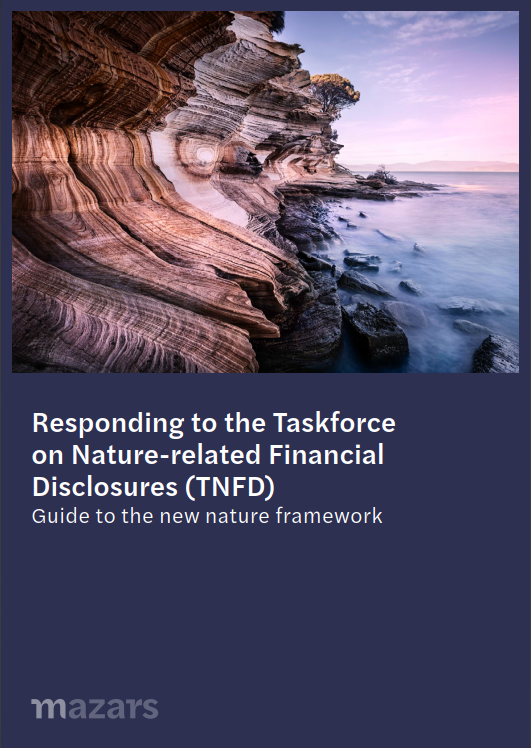
Responding to the Taskforce on Nature-related Financial Disclosures (TNFD)
The Taskforce on Nature-related Financial Disclosures (TNFD) aims to address this. Launching on 18 September 2023, the TNFD provides a risk management and disclosure framework for organisations to report and act on nature-related risks and opportunities.
By aligning with the TNFD principles, organisations have the opportunity to build sustainable value and resilience in their operations and supply chains, enhance stakeholder confidence and manage growing regulatory risk.
Who is the TNFD framework aimed at?
The TNFD framework is global, market-led initiative. It is intended for use by corporates and financial institutions of all sizes and follows on from the work of the Task Force on Climate-related Financial Disclosures (TCFD).
What does the TNFD framework ask for?
The TNFD describes 14 specific recommended disclosures organisations should include in their financial filings to provide “decision-useful” information. These are aligned with the TCFD’s 11 recommendations, plus an additional three for nature.
Will it be mandatory for organisations to undertake TNFD reporting?
Using the TNFD framework to report on nature-related risks and opportunities is wholly voluntary. But it’s worth noting that the TCFD also began as a voluntary framework but is now mandatory for some UK companies and has become an integral part of the disclosure regime.
How does reporting against the TNFD add value to my organisation?
- Business resilience: Recognising the nature-related ecosystem your company depends on is critical to ensuring continuity of your supply chain, workforce, and access to capital.
- Improved governance and risk management: Evaluating your processes in line with TNFD recommendations can strengthen efficiency and internal transparency.
- Reputation: There is growing public concern over the fragile state of our natural environment. Businesses perceived to be avoiding their responsibilities risk serious damage to their reputation.
- Opportunities: Understanding your interactions with nature can help to improve efficiency and unlock opportunities to lower operating costs and facilitate access to new markets.
Responding to the TNFD framework
At Mazars, we have extensive experience of working with clients to achieve a sustainable outlook both for compliance with reporting frameworks and added value through the streamlining of business processes and governance mechanisms.
To help you to comply with the TNFD while also delivering benefits to your stakeholders, our expert teams can support you with:
- Understanding the interfaces your organisation has with nature, to identify your key nature-related impacts, dependencies, risks and opportunities.
- Conducting a gap analysis on your current governance, strategy and risk management systems for responding to nature-related issues.
- Benchmarking your organisation against your peers and best practice, providing you with a clear direction of travel.
- Creating an implementation plan that will put you in a strong position for reporting against the TNFD and improve your resilience in the face of nature-related risks.
- Working with stakeholders at your organisation to draft a TNFD report that is robust, transparent, and aligned with the 14 recommendations.


